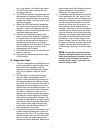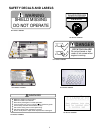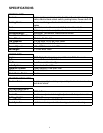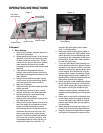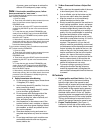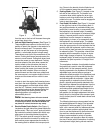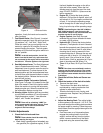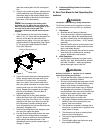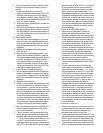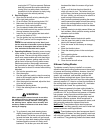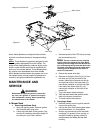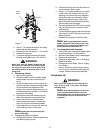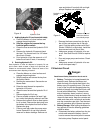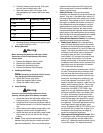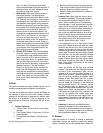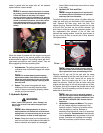15
e. This is a one person machine, operator only!
Riders are not permitted under any circum
-
stance!
f. To start the engine on the machine:
1. Make sure the park brake is set to the “ON”
position, both lap bars are in the neutral/
start position, and the Power Take Off (PTO
also referred to as blade control switch) is in
the “off” (down) position.
2. Move the engine speed control (throttle) for-
ward (half way).
3. Insert the ignition key, turn the switch toward
the spring-loaded “Start” position, maintain
the Start position until the engine begins to
run, then release the switch (it will return to
the “Run” position).
g. Check safety devices:
1. With the park brake engaged, try to move
one of the lap bars (speed/directional con
-
trol) from the neutral/start position - the lap
bars should not move with the park brake
engaged.
2. Repeat this procedure with the opposite
side lap bars.
3. With the park brake engaged and the lap
bars in the neutral/start position, advance
the engine speed control completely forward
(Hi-idle), engage the PTO control switch
(pull upward), then lift off the seat — the
engine should stop running. Sit down and
the engine should run. Turn off the PTO by
pushing the control switch down.
h. To drive in the FORWARD direction:
1. Set the engine speed to 2000 to 2500 rpm
(refer to tachometer on right control panel).
This must be increased to full speed (3525-
3675 rpm) after becoming familiar with the
machine.
2. Release the park brake.
3. Slowly, move both lap bars toward the front
of the machine until the machine begins to
move forward — release the lap bars and
the machine should stop moving. The more
that the lap bars are moved toward the front
of the machine, the faster the machine will
move in the forward direction. Release the
lap bars and the machine should stop travel
-
ing forward. (This is a safety check, the nor-
mal procedure is for the operator to slowly
bring the lap bars to the neutral position).
4. Do not advance the lap bars rapidly as this
could cause turf defacement, loss of trac
-
tion, and/or instability.
5. To turn, advance one lap bar ahead of the
other and the machine will turn toward the
opposite from the side that was advanced
— I.E. to turn clockwise (to the Right), move
the LEFT lap bar forward more than the
right side, and to turn counter-clockwise (to
the LEFT), move the RIGHT lap bar forward
more than the left side. NOTE: If one lap bar
is in the neutral position and the other is
advanced, the turn side tire will not rotate
and a “pivot turn” will be executed — turf
defacement could occur (if on grass) as well
as potential damages to the traction surface
and the tire. If the lap bar on the turn side is
not brought all the way to neutral, then the
turn side tire will continue to rotate and a “U-
turn” will be executed with a low potential for
turf defacement as well as traction surface
and tire damage.
i. To drive in the REVERSE direction:
1. Make sure no bystanders, animals, or
objects are behind the machine. Look
behind the machine, and use extreme care.
2. Slowly, move both lap bars toward the rear
of the machine until the machine begins to
move rearward. Release the lap bars and
the machine should stop. The more the lap
bars are moved toward the rear of the
machine, the faster the machine will move in
the reverse direction. Release the lap bars
and the machine should stop traveling in
reverse (this is a safety check, the normal
procedure is for the operator to slowly bring
the lap bars to the neutral position).
3. Do not retard the lap bars rapidly as this
could cause turf defacement and/or loss of
traction.
4. To turn, retard one lap bar ahead of the
other and the machine will turn toward the
same side that was retarded — I.E., to turn
counter-clockwise (to the LEFT), move the
LEFT lap bar rearward more than the right
side, and to turn clockwise (to the RIGHT),
move the RIGHT lap bar rearward more
than the left side. NOTE: If one lap bar is in
the neutral position and the other is
retarded, the turn side tire will not rotate and
a “pivot turn” will be executed. Turf deface
-
ment could occur (if on grass) as well as
potential damages to the traction surface
and the tire. If the lap bar on the turn side is
not brought all the way to neutral, then the
turn side tire will continue to rotate and a “U-
turn” will be executed with a low potential for
turf defacement as well as traction surface
and tire damage.
j. To perform a “zero turn”:
1. Please note, a zero turn maneuver can not
be executed while the machine is moving in
the Forward or, Reverse directions, the
machine must come to a stop first.
2. To turn clockwise, slowly move the LEFT lap
bar forward while simultaneously moving the
RIGHT lap bar rearward. Release both lap
bars and the machine should stop turning.
3. To turn counter-clockwise, slowly move the
RIGHT lap bar forward while simultaneously



